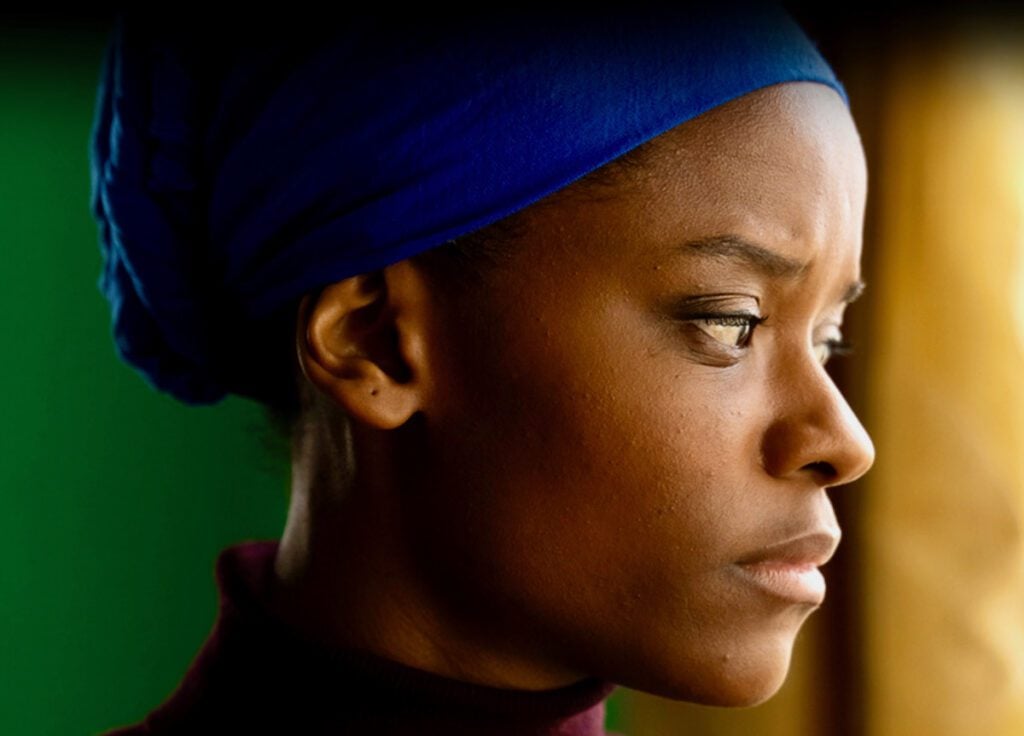The Tribeca Film Festival is back on track. In 2022, it offered both theater screenings and at-home TFF app viewings. Festival premieres and parties were back in full swing, and images of Black life were everywhere. Feature films, documentaries, shorts, series …
Aisha (***)

For Aisha Osagie (Letitia Wright, “Black Panther”), a Nigerian immigrant seeking asylum in Ireland, deportation is always on her mind. Living in constant fear, she’s caught in a maze of red tape, social services and immigration camps. Afraid to go home. Afraid to look forward. Writer/director Frank Berry (“Michael Inside”) takes a page out of the Ken Loach (“I, Daniel Blake”) fight-the-system playbook, as he explores the plight of those who’ve left dangerous circumstances and sought refuge among Europe’s working class. Not much in the protagonist’s life goes right. Two steps forward, three steps back. Phone calls back to the motherland indicate certain death if she goes home. Aisha’s only glimpse of hope is a white security guard, Conor (Josh O’Connor, “The Crown”), who is smitten. When he asks about her feelings she replies: “Sometimes I’m happy. Sometimes I’m scared.”
Deliberate pacing pulls you into a life that’s a slow wreck. Desperation and melancholy are prevalent. A gut-wrenching performance by Wright, whose Aisha echoes the thoughts of many immigrants: As the Earth beneath Aisha is pulled out from under her again and again you sink into her uncertain life and constant misery.
The Big Payback (****)

Reparations is a buzz word that spikes intense feelings — for and against. Most of the consternation revolves around why and how making amends for yesterday’s wrongs would work today. Actress Erika Alexander (“Living Single” and “John Lewis: Good Trouble”) and documentarian Whitney Dow (“Two Towns of Jasper”) have honed their take on the subject with their narrative podcast: “Reparation: The Big Payback.” Their exceptional insights are evidenced by an enlightening doc that’s as well researched, detailed and footnoted as a Ph.D. thesis. As any scholar would do, they argue their case using a prime example.
In Evanston, Illinois, the astute city alderwoman Robin Rue Simmons makes it her mission to discuss, fund and systematically return the wealth of the nation to the local descendants of African slaves.
Watching her build community consensus among Black and white folks and put theory into action is a marvel in grassroots activism. Footage, photos and interviews explain history and options for the future. This very enterprising doc about a results-proven activist provides a doable blueprint for getting things done. Listen up!
The Cave of Adullam (***)

“I thought Black boys needed discipline. Instead, they needed love.” That realization changed the way Jason Wilson, a Detroit martial arts sensei, mentored troubled youth. The Black boys who attended the martial arts program at his academy, “The Cave,” are taught how to be disciplined and express their deepest feelings. Teaching them how to battle on a mat is a metaphor for fighting through the painful parts of their lives. Those combat skills help them cope with family, school and conflict resolution issues.
Documentarian Laura Checkoway has the presence of mind to be invisible. When the camera follows Wilson and his mentees (Tamarkus, Gabe, Daniel and Kevin), you’re the ghost in the room at school, prisons and homes. As the boys wrangle their anger and fear and Wilson points them toward their inner selves, watching these traumatized kids heal becomes a cleansing experience.
The filmmakers should take pride in producing an illuminating doc that feels as raw as reality TV minus the fakery.
Hargrove (***1/2)

Jazz trumpeter and flugelhorn player Roy Hargrove isn’t as famous as Miles Davis, but his command of his instruments is nearly equal. Both made their trumpets sing, improvised on the cuff and were style icons. Both fought drug addiction demons, too. The key differences are Hargrove’s more mellow nature and his status as the hip-hop generation’s ultra-cool jazzman. White suits, Air Jordans, funky sunglasses.
Quoting classic books and hailing Ravel, it’s obvious that Hargrove is an intellect who infuses art, culture and literature into his music. He studies a song’s minutiae before he interprets it: “If you know the words (lyrics) you can really play the melody.” His heady philosophies on life and death are fascinating too: “If there is a heaven, and there is a jam session going on, he’s (God) not letting Coltrane sleep.”
Doc maker Eliane Henri marks her directing debut with a travelogue bio that follows Hargrove on his last tour in beguiling European settings, like Italy’s gorgeous Sorrento. The perfect blend of technique, spiritualism, anecdotes and live performances capture his essence. Rifts with his abrasive manager, Larry Ragman Clothier, provide drama. Recollections from Herbie Hancock, Christian McBride and Erykah Badu fill in the cracks. Evocative cinematography (Robert Benavides), soulful jazz music and judicious editing (Joseph Marconi) load the senses with beautiful visions, beguiling sounds and a steady rhythm.








